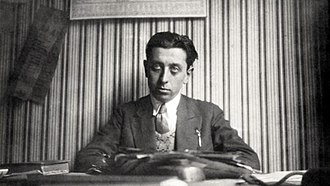Robert Desnos
Robert Desnos [ ʁɔˈbɛːʁ dɛsˈnoːs ] (born July 4, 1900 in Paris , † June 8, 1945 in Theresienstadt ) was a French writer and journalist . Influenced in particular by Nerval and Baudelaire , he wrote mainly poetry - even in the concentration camp . One of his main subjects was love. Ehrenburg quotes Paul Éluard approvingly : “Of all the poets I knew, Desnos was the most immediate, the most free; he was a poet who never left inspiration; he could speak as hardly a poet can write. He was the bravest of them all. "
Life
Desnos left his middle-class family at the age of sixteen, joined anarchist circles, and did odd jobs. After his military service in Morocco , the young writer joined the Parisian Dadaists around Tristan Tzara , André Breton , Paul Éluard, Philippe Soupault , Max Ernst and Francis Picabia in 1919 . In the "time of sleep" Desnos was primarily concerned with researching the unconscious and made numerous dream protocols. He stayed above water as a journalist, for example for the surrealist magazine La Révolution Surréaliste (twelve issues, 1924–1929) and for Eugène Merle's Paris-Matinal .
Punished by André Breton in the Second Surrealism Manifesto in 1930, Desnos responded with an article in the anti-Breton pamphlet Un Cadavre (A Cadaver), to which Georges Ribemont-Dessaignes , Georges Bataille , Jacques Prévert , Georges Limbour , Roger Vitrac , Antonin Artaud , Philippe Soupault, André Masson and Jacques-André Boiffard . According to Winfried Engler , he set himself apart from the surrealist "aesthetics of incomprehensibility". Another point of contention was the Communist Party , from which Desnos distanced himself in contrast to Breton.
During this time he met the Japanese (and much-acclaimed muse ) Youki Foujita, who became his lover. Tired of the newspaper business, he became an employee of a housing agency in 1931. From 1935 he worked mainly for radio. In the newspaper Aujourd'hui he polemicized against the (right-hand) writer Celine . Active in the French resistance movement Résistance , he was arrested in 1944 because of a denunciation by the German occupying forces. He went through several concentration camps and had to do forced labor in armaments production in Flöha , in a satellite camp of the Flossenbürg concentration camp . Desnos fell ill with typhus and died a few weeks after the Theresienstadt concentration camp was liberated .
Works
- Deuil pour deuil , poems, 1924
- La Liberté ou l'amour , Paris 1927
- L'etoile de mer , film, 1928 (with Man Ray )
- Corps et biens , poems 1921–1929, Paris 1930
- Sans-cou , poems, 1934
- La cantate pour l'inauguration du Musée de l'Homme , cantata, 1937 (together with Darius Milhaud )
- Fortunes , poems, Paris 1942
- Le vin est tiré , Roman, Paris 1943
- Etat de veille , poems, 1943
- published posthumously
- Choix de poèmes , poems, 1946
- Ouvres posthumes , poems, 1947
- Domaine public , poems, 1953
For some editions / selected volumes in German, see the National Library link
literature
- Pierre Berger: Robert Desnos. Paris 1949.
- Rosa Buchole: L'evolution poétique de Robert Desnos. Brussels 1956.
- Ilja Ehrenburg : People - Years - Life. (Memoirs), Munich 1962, special edition Munich 1965, Volume II 1923–1941, pages 173–179 (portrait), ISBN 3-463-00512-3 .
- Mary Ann Caws: The surrealist voice of Desnos. USA 1977.
- Reinhard JA Pohl: The metamorphoses of the negative hero ... Desnos. Hamburg 1977.
- Marie-Claire Dumas: Robert Desnos ou l'exploration des limites. 1980.
- HL Davis: Robert Desnos: Une voix, un chant, un cri. 1981.
- Marie-Claire Dumas: Moi qui suis Desnos. 1987.
- Marie-Claire Dumas (Ed.): Cahier de l'Herne. Special issue Desnos, 1987.
- Michel Murat: Robert Desnos: les grands jours du poète. Paris 1988.
- Dominique Desanti : Robert Desnos: le roman d'une vie. Mercure de France, 1999.
- André Bessière: Destination Auschwitz avec Robert Desnos. Paris 2001, ISBN 2-7475-0180-9 .
- Anne Egger: Robert Desnos. éditions Fayard, 2007.
- Marie-Claire Dumas (Ed.): Robert Desnos, le poète libre. éditions Indigo / Université de Picardie Jules Verne, 2007.
- Fiction
- Werner Streletz : The freest of all poets: on the way with Robert Desnos: Novelle . Bochum: projektverlag, 2017
Web links
- Literature by and about Robert Desnos in the catalog of the German National Library
- Works by and about Robert Desnos in the German Digital Library
- Félix Labisse: Association des amis de Robert Desnos , founded in 1985 (French)
Individual evidence
- ↑ “Das Phonetik-Blog”, January 21, 2009
- ↑ According to Kindler's New Literature Lexicon , Munich 1988 edition
- ^ Munich 1965, page 173
- ^ Ehrenburg Munich 1965, page 174
- ↑ Winfried Engler : Lexicon of French Literature (= Kröner's pocket edition . Volume 388). 3rd, improved and enlarged edition. Kröner, Stuttgart 1994, ISBN 3-520-38803-0 .
- ↑ Ehrenburg (Munich 1965, p. 173) cites Desnos' demand that a poet must understand and be understood
- ↑ Ehrenburg Munich 1965, page 175
| personal data | |
|---|---|
| SURNAME | Desnos, Robert |
| BRIEF DESCRIPTION | French poet, writer and journalist |
| DATE OF BIRTH | 4th July 1900 |
| PLACE OF BIRTH | Paris |
| DATE OF DEATH | June 8, 1945 |
| Place of death | Theresienstadt |


